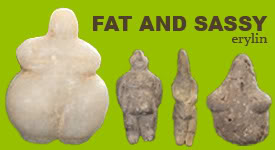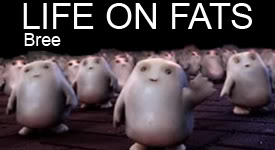Schools, fat and fit (part 2)
Mild Trigger Warning: The following contains a letter outlining a gym teacher’s biased lesson on exercise and thinness, and the potential consequences, such as eating disorders.
Last time we spoke, it was about the fantastic Holley Mangold and the sad actions of my kids’ gym teacher. This week, I decided to do something about it. I was sick of just being mad, and I wanted to DO something. Then the amazing Linda Bacon wrote this article, and I started doing a little happy dance. Without further ado, here is what I sent to my kids’ principal on March 20th:
Because I know you to be a caring person with the best intentions for the students you work with, I hope you will be concerned to know that actions and messages in a recent gym class may be unintentionally harming everyone who comes into contact with them. Both of my daughters came home and told me that their gym teacher is teaching them “if you exercise just 20 minutes a day you will be skinny,” which is simply not true. There are TONS of athletes who exercise 4-5 hours daily and weigh over 300 lbs. Look at Hollyy Mangold, who weighs 374 lbs and just made the Olympic weightlifting team.
For reasons I’ll explain, I urge you to reconsider teaching kids that working out will automatically make you skinny. An issue of prejudice is at stake here with implications for the health, morale and productivity of our students.
I hope you will take this as seriously as you would a claim of racism because it is parallel. Unfortunately, the lesson encourages weight stigmatization. (It should also be mentioned that this stigma falls especially hard on minority and disempowered groups, including women and people of color). I realize the harm is unintentional, but so long as you continue this program, you are hurting people, fat and thin alike.
Even setting aside the serious issue of prejudice, this lesson is unlikely to have the intended effect of helping people. There is no evidence that educational campaigns like this one, based on fat stigma, yield any long-term benefit for people’s health and lives. Rather, the evidence suggests that providing this “education” is damaging. Regardless of whether the information is accurate (and I would argue that it is very misleading), consider that it is delivered in a context where fatter people are regularly pummeled with “news” that their bodies constitute a horrifying health crisis, and the “fat is bad” message is already well-established in everyone’s mind.
Even if fat alone does play a role in an individual’s ill health (social inequity — rather than nutrition, fitness, and other behaviors — actually proves far more significant), studies repeatedly find that it’s nearly impossible to banish. Most every diet fails in the long run for almost all people. Biological mechanisms dictate that the majority of us could no more diminish our girth, lifelong, than make ourselves taller or modify the shape of our ears. And Mr. [GYM TEACHER] isn’t even arguing that it’s for health. He is saying exercise will make you skinny. Not strong. Not fit. Not healthy. But SKINNY.
Meanwhile, data show that the repeated loss/regain cycles that result from trying to lose weight are far more harmful, medically, than maintaining a stable weight, even if it’s high. Yo-yo weights are linked to cardiovascular disease, diabetes and other “obesity-related” ailments, so implying that the pursuit of weight loss is valuable is just bad medicine.
His campaign will succeed in little more than shaming the larger members of our school and making the rest of them feel insecure about becoming like them. The fact is that anti-obesity efforts have been shown to discourage the very types of behaviors they try to promote, namely good nutrition and exercise. Fat people already know they’re fat. “Obesity awareness” efforts are not just pointless but counter-productive; no psychologist would argue that shame, or even fear, stimulates positive long-term behavior change. Meanwhile, thin people may wrongly conclude they’ve got a “free pass,” and that fitness and nutritional considerations don’t matter for them.
The worst part is that by pursuing a misguided strategy, we may be missing the chance to do good. Evidence increasingly shows that a focus on health and health habits, rather than weight, can do a world of good. The weight-neutral, body-positive Health At Every Size® movement has shown that people who accept the bodies they’re in are far more likely to care for them through good nutrition and exercise. If our organization truly wants to improve the lives of its members, greater acceptance is the way to go, not stigmatization.
There’s more we can do. I would be glad to provide more information about the data and support behind the Health at Every Size approach and happy to brainstorm with you on ways our school could encourage better health for our students.
For all these reasons, I ask you to look at changing the message that Mr. [GYM TEACHER] is giving: that if you work out for 20 minutes a day you will be skinny. Have him use different words. Use fit, use healthy, use active. Just don’t base it on body size, which many of us, ESPECIALLY those students going through puberty, or kids that are growing, can’t really control. If you don’t think that’s appropriate, then I would like to meet with you in person and/or hear your justification, addressing the points I’ve made, for perpetuating stigmatizing “education” that is likely to have damaging results.
For more information on weight and health, and Health at Every Size, check out Health at Every Size: The Surprising Truth About Your Weight by Dr. Linda Bacon. The HAES Manifesto, taken from the appendix, is a short, user-friendly synopsis of these issues. Bacon and Aphramor’s peer-reviewed article, Weight Science: Evaluating the Evidence for a Paradigm Shift, provides academic support.
I truly believe that by perpetuating these stereotypes, we lead many of our young children toward eating disorders. Children as young as five are entering treatment for anorexia. I hear my eight- and nine-year-old daughters use fat as a bad word. Olivia, who is practically vegetarian, is starting to eat less and less, because she says she is fat. She eats SUBSTANTIALLY less than Abby does, who, at a year older is 15 lbs skinnier. Sometimes, eating habits and exercise levels really don’t make you skinny. But it CAN make you healthy, and that is were we should be coming from. I also think Mr [GYM TEACHER] should not be handing out Vanilla Cokes as a “prize” in gym class for doing well on a skill. These mixed messages about food are confusing and damaging to young minds trying to make head or tails of this CHEETOS! No DIET SODA! world.
Less than four hours after sending this to the principal, she had met with the gym teacher and called me in total agreement. They are going to revisit this in a future gym class and reinforce that exercise = fit, healthy, and balanced, NOT skinny.
/CHEER























Erylin, that was a kickass letter. Congratulations on making a difference, and for inspiring others to speak up.
Theresa
Cheers to you! I wish someone had known about Health at Every Size when I was in school and could have sent a letter like this one to my schools and teachers. It would have made SO MUCH difference! I’m also totally THRILLED to hear that the principal heard what you had to say and actually DID SOMETHING about it!
This is so inspiring than you for sharing this!
Great letter and awesome response from the principal - sometimes it does pay to stand up for yourself and your kids (and all the other kids that teacher will reach). Congratulations.
You go Erylin!
What a splendid letter! I am adding your references to my mini-research project for the book I am editing for a major publisher. How gratifying to have such a positive response from the principal. Having tried to interact with certain school personnel on other issues with very different responses I am so grateful you found the right kind of openness. Congratulations for an intervention brilliantly done.
Laurna
Glad you found my letter template helpful, Erylin, and I particularly liked the way you customized it with your last paragraph. Great to know this can be successful! (If others want to copy the template, or see my commentary about it, you can follow the link Erylin provided at the beginning.) Please consider writing a comment on my blog post (at least linking here) - it would be great to see all the success stories told there.
For others not familiar with my work, know that part of my mission is to provide everyone with educational tools they can use to spread the word and make change. The links in the letter will get you to some of my educational materials, and I’d particularly like to give a shout out to the Appendix of my book which has many letters that are customized to different situations - most of these are freely downloadable from the book’s website (www.haesbook.com).
I’ll keep coming out with linkable educational tools; if anyone wants a heads up when I do produce stuff, feel free to follow me on social media. Links to find me are on my website: http://www.lindabacon.org.
Great to know there are so many of us speaking out. Change is happening. I’m honored to be part of our courageous community. Rock on…
HOW FANTASTIC!!! I am so impressed both with your letter and with the principal’s response. Just blown away.
Congratulations! Great work, to you and to Linda Bacon. Thank you to Linda for providing this terrific template, applying your knowledge of effective persuasive communication for organizations. And I, too, really appreciated your personalization of Linda’s letter.
Thank you for standing up for ALL of the kids in your children’s school. They will all benefit from this, and by posting your WINNING letter here, you are a role model and inspiration for others of us. Thanks.